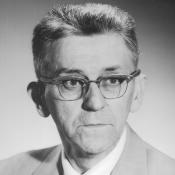William Joseph Vatter
 This versatile and insightful scholar pioneered new ways of thinking about accounting that significantly influenced accounting research, practice and teaching. Born in Cincinnati, Ohio, in 1905, he had much musical talent and played the viola, violin, piano, and French horn. Although he thought seriously about a career as a symphony musician during the early 1920s, he later became an auditor for the Singer Sewing Machine Company. In 1930 he married Rose H. Schumacher. He lost his job at the height of the Great Depression in 1931, but a loan from an uncle enabled him to return to college and prepare for the CPA Examination.
This versatile and insightful scholar pioneered new ways of thinking about accounting that significantly influenced accounting research, practice and teaching. Born in Cincinnati, Ohio, in 1905, he had much musical talent and played the viola, violin, piano, and French horn. Although he thought seriously about a career as a symphony musician during the early 1920s, he later became an auditor for the Singer Sewing Machine Company. In 1930 he married Rose H. Schumacher. He lost his job at the height of the Great Depression in 1931, but a loan from an uncle enabled him to return to college and prepare for the CPA Examination.
In 1934, at the age of 29, he graduated with highest honors from Miami University in Ohio where he remained as an instructor for two years. In 1936, he became a CPA in Ohio and moved to the University of Chicago . He taught accounting there and worked toward his MBA degree, which he received the next year. He remained on the School of Business faculty; from 1942 to1944 he served as Director of Finance for the Metallurgy Laboratory of the Manhattan Project. He received his PhD in 1946, and the following year he was promoted to professor of accounting. In 1957, he left Chicago for the University of California-Berkeley where he remained until his retirement in 1972. He died in 1990.
Throughout his academic career William J. Vatter was a prolific and influential author and a revered teacher, colleague, and mentor. His published writings include the classic monograph on The Fund Theory of Accounting and Its Implications for Financial Reports, the frequently reprinted article, “Limitations of Overhead Allocation,” and a preliminary edition of a textbook, Managerial Accounting (1950), that led the way for a new approach to teaching managerial accounting. In over 50 published papers, he repeatedly demonstrated his ability to weave abstract theory and practical applications into a single context. His commissioned report to the Comptroller General, Standards for Cost Analysis, broke new ground, especially on methods of allocating costs. It was the principal conceptual basis of the Cost Accounting Standard Board's initial pronouncements. He was admired as a person and as a scholar by all who knew him.
Among his many honors and awards, he was named an Honorary Fellow of the Australian Society of Accountants. He received many honors and awards during his lifetime, including two Fulbright Awards that took him to Australia where he had a great impact on accounting education. He also received the American Accounting Association's Outstanding Educator Award and the Centennial Citation from UC Berkeley. He is the seventy-sixth member of the Accounting Hall of Fame, William Joseph Vatter.
 This versatile and insightful scholar pioneered new ways of thinking about accounting that significantly influenced accounting research, practice and teaching. Born in Cincinnati, Ohio, in 1905, he had much musical talent and played the viola, violin, piano, and French horn. Although he thought seriously about a career as a symphony musician during the early 1920s, he later became an auditor for the Singer Sewing Machine Company. In 1930 he married Rose H. Schumacher. He lost his job at the height of the Great Depression in 1931, but a loan from an uncle enabled him to return to college and prepare for the CPA Examination.
This versatile and insightful scholar pioneered new ways of thinking about accounting that significantly influenced accounting research, practice and teaching. Born in Cincinnati, Ohio, in 1905, he had much musical talent and played the viola, violin, piano, and French horn. Although he thought seriously about a career as a symphony musician during the early 1920s, he later became an auditor for the Singer Sewing Machine Company. In 1930 he married Rose H. Schumacher. He lost his job at the height of the Great Depression in 1931, but a loan from an uncle enabled him to return to college and prepare for the CPA Examination.